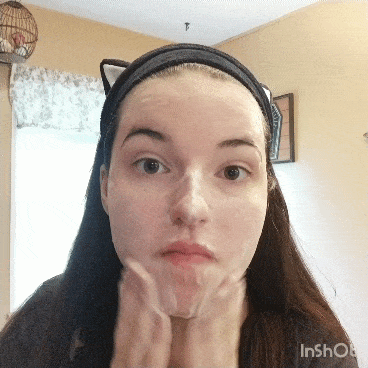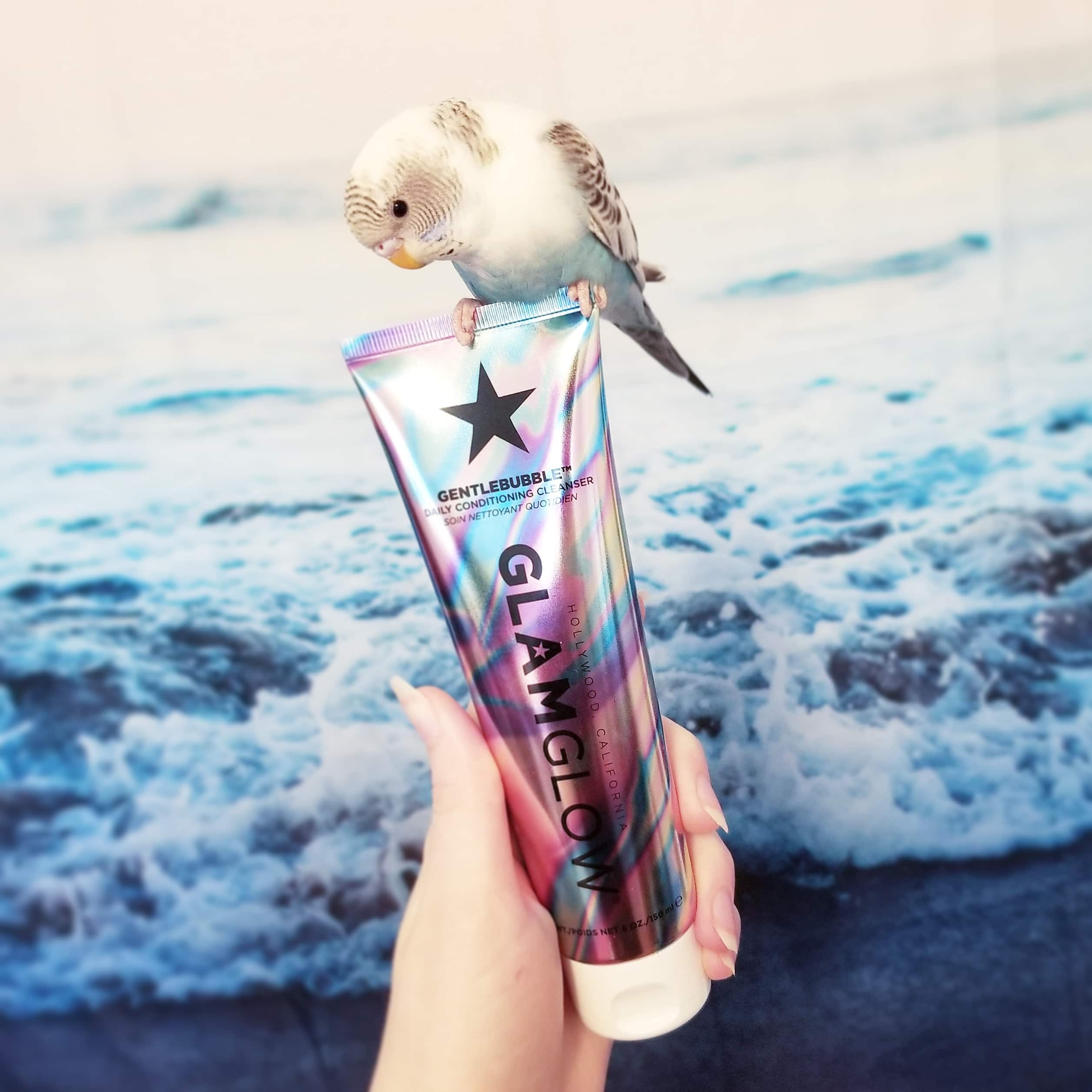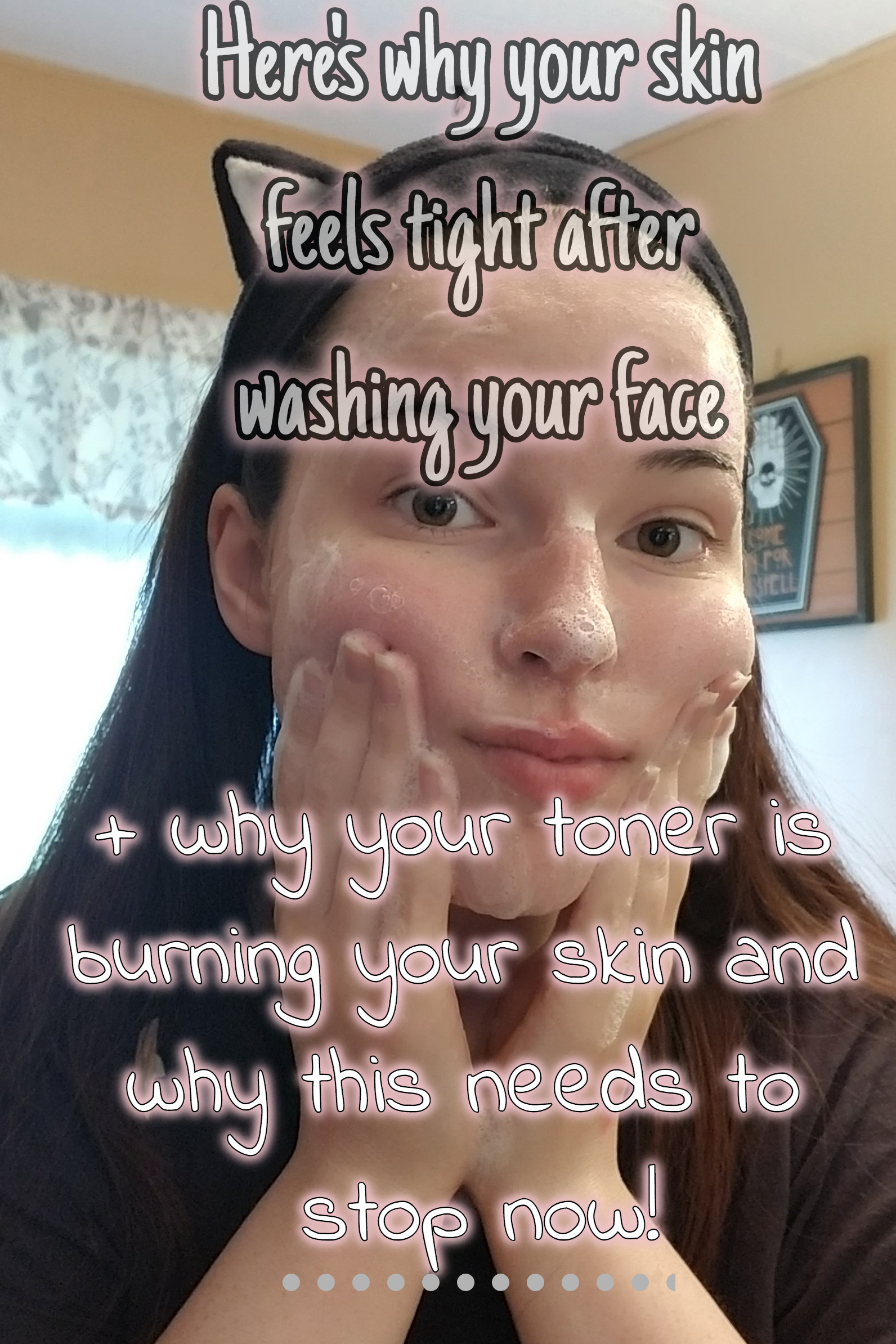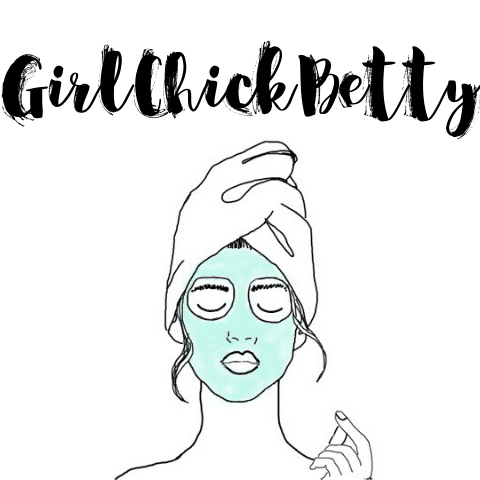
Growing up I always equated my skin feeling tight after washing or after a shower to mean that my products were getting the job done. I also figured that stinging sensation from my toner meant it was working great! What I wish I knew back then is stinging sensations and tight feeling skin are actually signs that you’re wreaking havoc on your complexion!
Why does my skin feel tight after washing it?
If your skin feels tight after washing your face or using a face mask this means you have stripped too much oil out of your skin. If you go overboard with the suds you can actually damage your skin barrier! The pH of (healthy) skin is between 4.5 and 6.2 and when you use a highly acidic face wash it breaks down that protective acid mantle. The higher the pH level, the more corrosive the cleanser and the more damage it can do!

Your skin might feel smooth at first after using a harsh cleanser but it’s going to flip to feeling irritated and loose that smooth feeling lickety-split.
It can be tempting to go to town with harsh cleansers especially when you have oily skin. I was the poster child for using waaaaaaay too harsh cleansers in my teens while I was trying desperately to make my oily skin troubles disappear.
This post contains affiliate links; if you snag a product through my link it will send some spare change my way to keep this slice of the internet up and running.
What is your acid mantle?
Your skin actually has a protective layer called the acid mantle which is comprised of a mix of sebum, amino acids, fatty acids, lactic acid, and water (from your sweat). This slightly acidic layer protects your skin from bacteria, viruses, and other contaminants that can enter your skin.
Your acid mantle secretes enzymes that help break down excess sebum, keeping the skin’s oils in balance. When you remove this mantle while trying to get rid of oil, you’re actually just making it worse for yourself in the long run! If you strip your skin of all it’s oils it will just go into overdrive and start overproducing sebum. You’ll be right back where you started; actually worse off!
Skin can re-balance it’s natural PH levels after a normal skin cleansing within 30 minutes. If you go overboard and damage your skin’s acid mantle it can take up to 2 weeks to fully repair itself (assuming you don’t damage it more in the meantime).
Ok, so why do toners sometimes burn?
I hope you’ve clued into the answer already but just in case, it’s not good that your toner is stinging/burning! The purpose of a toner is to help re-balance your skin’s pH after using a cleanser. If it’s burning that means the pH is so high that it’s actually irritating your skin and causing damage.
A burning sensation is usually due to an alcohol-based formula. These are getting less and less popular as skincare brands evolve but they are still floating around. And for the love of god, do not use rubbing alcohol as a toner! Yes, it can dry out acne, but it also dries out literally everything else in your skin.
Skincare can sometimes slightly tingle, and that’s ok!
Sometimes, the tingling’s is nothing to be worried about and is not going to damage your skin barrier. Chemical exfoliants frequently cause a slight tingling sensation. This is even more likely if you have sensitive skin. All of the various acids below can cause a slight tingling sensation. It may even feel warm at times but this should last seconds before fading away. This feeling means the product is penetrating the skin and is no cause for worry. If the tingling ever turns into burning you should be worried.
Ingredients that can cause tingling include:
- Glycolic acid
- Lactic acid
- Salicylic acid
- AHAs & BHAs
- Retinols
When should you worry about a product tingling too strongly?
When a too high concentration is used on sensitive skin or is left on for too long, it can actually turn into a chemical burn. If this ever happens to you make sure to rinse off the product quickly to stop the reaction and prevent any further damage.
Not everyone will experience tingling when using acids. This can depend on the concentration of the product and how sensitive your skin is. The higher the concentration, the more likely you’ll feel a tingling sensation.

Should your skin feel tight after using a mud mask?
Your clay masks should also never leave your skin feeling tight, keep up people! I recently discovered it’s actually best to remove the mask before it completely dries down to that uncomfortable cracking level of dry. This is for the same reason you shouldn’t leave sheet masks on for too long which I wrote an entire rant on here. If you let the mask completely dry down it actually starts sucking the moisture right back out of your skin and causes that dry itchy feeling.
How long should you keep a clay mask on?
The sweet spot to chill in your clay mask is 15-20 minutes. Always read the instructions before slapping on a new mask; the time frame can vary depending on the ingredients.
Sharon McGlinchey the creator of Organic Skincare told Allure in her 2013 interview:
“There are three phases of clay masks. There’s the damp phase where your skin drinks in the beneficial minerals from the outside. Next, there’s the start of the dry phase. This exercises your capillaries and stimulates blood flow as the mask cools and contracts. Then finally there’s the dry phase, which draws out moisture from the surface of your skin, causing dehydration and irritation.”
pH friendly cleansers that won’t leave skin feeling tight
The easiest way to protect your skin barrier is to use products that are pH friendly and appropriate for your skin type. Foaming, soap-based cleansers with astringent properties tend to strip away the sebum that makes up your acid mantle. On the other hand, oil-based cleansers are great at removing makeup and excess oil without stripping your skin. Oil breaks down oil, so you will still be cleansing the skin of excess oil while protecting your acid mantle. Your end goal is to still have supple moisturized skin after cleansing. It should never feel tight or dry!
It may seem counterintuitive to “fight fire with fire” but yes you can fight oily skin with more oil!

What cleansers cause tight feeling skin?
Here’s a good rule of thumb to keep in mind. The more a cleanser lathers the more likely it has a high pH. Now I’m not saying all foaming face washes are evil! Lathering is just one way of identifying a product that might be too harsh for your skin type. This is why cult classic favorites like the Cetaphil Gentle Skin Cleanser are so great for sensitive skin. Cetaphil barely lathers and is a super pH friendly product. You’ll get a ton of bang for your buck with this cleanser. I picked up a huge bottle from iHerb for under 12 bucks!
The Glam Glow Gentle Bubble cleanser I’m holding above is a new pH friendly favorite of mine. Pepper our parakeet also approves (he photobombed my photo-taking session, “You’re trying to take pictures of me right?”) It’s extremely gentle which makes it great for everyday use. I have found it falls a bit short on removing makeup thoroughly. If you’re wearing heavy makeup it’s a great idea to double cleanse. You can find it here on Sephora.
Oil-based cleansing balms are yet another stellar way to remove 100% of your makeup without stripping your skin barrier. These nifty cleansers break down makeup even if it’s waterproof and help you remove every last bit of product. It’s a tad on the spendy side but I recently got to play around with the Farmacy Green Clean Cleansing Balm. I was blown away by its cleansing power. It’s basically a genie in a bottle and you can check it out here at the Sephora site.
Pain does not equal beauty!
So the moral of this story is tight skin should be avoided and stinging sensations are also bad news. A good cleanser will always leave your skin feeling supple, bouncy, and clean without stripping those precious facial oils away.
What are some of your go-to products to keep your skin in check?

Recent Posts
There are two new sunscreens on the block and the lovely folks over at Kinfield gifted some tubes for me to to test out so I can share a skincare deep dive with y'all! This post contains affiliate...
Trying to find a sunscreen formulated without glycerin is no easy task! I've researched hundreds of sunscreen formulas while writing for this blog and it's shocking how extremely few glycerin-free...
